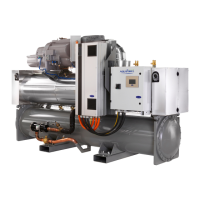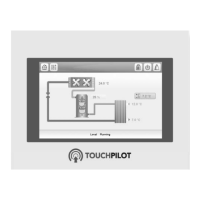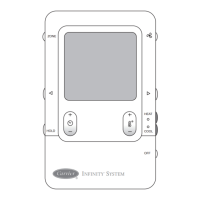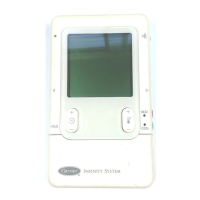16
If two pumps are controlled and the reversing function has
been selected (see User conguration), the control tries to
limit the pump run time delta to the congured pump change-
over delay. If this delay has elapsed, the pump reversing
function is activated when the unit is running. During the
reversing function both pumps run together for two seconds.
If a pump has failed and a second pump is available, the unit
is stopped, because no water ow is detected, and then re-
started with the second pump.
The control provides a means to automatically start the pump
each day at 14.00 for 2 seconds when the unit is off. If the
unit is tted with two pumps, the rst pump is started on odd
days and the second pump is started on even days. Starting
the pump periodically for a few seconds increases the life-
time of the pump bearings and the tightness of the pump seal.
Control of the condenser water pumps is the same as for the
evaporator water pumps. See previous chapter.
NOTE: If a pump fails, the Energy Management Module
(EMM) as well as a condenser water ow detector are
required for automatic changeover to the second pump.
This function controls the unit compressor capacity reduction.
If there is an alarm or a demand to stop it forces the com-
pressors to the minimum capacity before stopping them.
This stop sequence is not followed if there is a unit protection
alarm such as “water heat exchanger frost protection” or “low
saturated suction temperature”.
Once the circuit has stopped, the EXV waits for the pressure
balancing or one minute, before it closes completely.
The unit can control one or two evaporator water pumps.
The pumps are turned on when this option is congured (see
PUMPCONF conguration sub-menu) and when the unit is in
one of the on modes described above or in delay mode. Since
the minimum value for the delay at start-up is 1 minute
(congurable between 1 and 15 minutes), the pump will run
for at least one minute before the rst compressor starts.
The pump is kept running for 20 seconds after the unit goes to
stop mode. It is turned off if the unit is shut down due to an
alarm, unless the fault is a frost protection fault.
The table below summarises the unit control type and stop
or go status with regard to the following parameters.
• Operating type: this is selected using the start/stop
button on the front of the user interface.
Local o
L-C Local on
L-SC Local schedule
Remote
Network
• Remote start/stop contacts: these contacts are used
when the unit is in remote operating type (Remote).
See chapter 3.7.2.
CONTROL
L-C L-SC MAST
Remote start/
Master
time schedule
shutdown
General
alarm
- - - - - - - - - - Active - - O
- - - - - - - - - - - Ye s - O
- - - - Active - O - - - - - Network O
- - - - Active - - - - Unoccupied - - Network O
- - - - - Active O - Network - - - Network O
- - - - - Active - - Network Unoccupied - - Network O
- - - - Active - On - - Occupied Disabled No Network On
- - - - - Active On - Network Occupied Disabled No Network On
Active - - - - - - - - - - - Local O
- - Active - - - - - - Unoccupied - - Local O
- - - - - Active - - Local Unoccupied - - Local O
- Active - - - - - - - - Disabled No Local On
- - Active - - - - - - Occupied Disabled No Local On
- - - - - Active - - Local Occupied Disabled No Local On
- - - Active - - - Open - - - - Remote O
- - - Active - - - - - Unoccupied - - Remote O
- - - - - Active - Open Remote - - - Remote O
- - - - - Active - - Remote Unoccupied - - Remote O
- - - Active - - - Closed - Occupied Disabled No Remote On
- - - - - Active - Closed Remote Occupied Disabled No Remote On
• CHIL_S_S: this network command relates to the unit
start/stop when the unit is in network mode.
• Command set to Stop: the unit is halted.
• Command set to Start: the unit runs in accordance
with schedule 1.
• Start/Stop schedule: occupied or unoccupied status of
the unit as determined by the unit start/stop program
(Schedule 1).
• Network emergency shutdown: if this CCN or BACnet/
IP (option) command is activated, it shuts the unit
down whatever the active operating type.
• General alarm: the unit is totally stopped due to failure.

